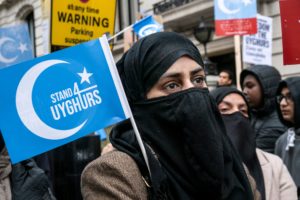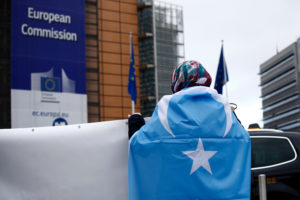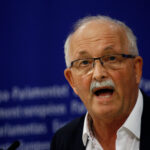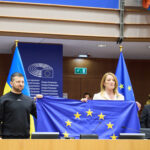EU Watch interview with the leadership of the World Uyghur Congress
The World Uyghur Congress (WUC) is an organisation that strives to promote democracy, human rights, and freedom for the Uyghurs in China. It promotes peaceful nonviolent and democratic means to determine the Uyghurs’ political future.
EU Watch spoke with: WUC President Dolkun Isa; WUC Chair of the Women’s Committee and advocacy manager for the Uyghurs at the United Nations Zumretay Arkin; WUC EU Policy Coordinator Koen Stoop.
What is the situation of the Uyghurs in China right now?
Zumretay Arkin: It is really dire. There is a genocide perpetrated against them by the Chinese authorities. Unfortunately, we do not have access to a lot of information. What we know is based on Chinese documents, for example, procurement papers for forced labour. The Xinjiang Police Files really gave us a clearer picture of what is going on and how Uyghurs are being detained arbitrarily.
It has been alleged that the Chinese government uses forced labour as part of their repression of Uyghurs. What can the WUC do against it?
Zumretay Arkin: The issue of forced labour has made a lot the headlines in the past two years. Foreign companies are complicit in this by procuring products or services from Chinese companies that are using forced labour. This is something that we are really focused on. We are working at all levels, especially in the European Parliament, but also United Nations and other spaces. Now, the Uyghur Forced Labour Prevention Act has been implemented by the US government. This is the first legislation that really tackles this issue. The European Commission is proposing its EU due diligence legislation in September, on which we have worked hard.

Muslims protest Uyghur genocide in front of Chinese embassy, London, November 13, 2021. Koca Vehbi/Shutterstock.com
What is happening on the ground that according to you amounts to genocide?
Zumretay Arkin: One of the main reasons Chinese oppression amounts to genocide is the forced sterilization of women. Women are being sterilized inside and outside of the internment camps. Some former detainees have told us that conditions inside these camps are extremely difficult. There is widespread torture, abuses such as rape – even gang rape – especially of women, but also men, and physical and psychological torture. These testimonies were shared by former detainees who were able to leave because they had foreign citizenship or married a foreigner. We have a lot of camp survivors, but unfortunately, not all of them can speak out, for fear of repercussions against their families still in the region. We have around a dozen camp survivors who are speaking publicly and have contributed immensely to exposing the atrocity of what is happening.
Also, at least a million Uyghur children have been separated from their parents. Sometimes both parents are interned in concentration camps and children are being taken to state-run orphanages where they are stripped of their cultural and religious identity. The state controls the children’s curriculum and their daily behaviour.
“The EU is too dependent on China economically to really name and shame China.”
What other means of oppression does the Chinese government use?
Zumretay Arkin: There is also a mass surveillance network system. We have lost contact with our family members since 2017. Dolkun Isa lost his mother in a concentration camp a couple of years ago. I have over thirty of my relatives that are in camps or have disappeared. Then, there is the issue of the refugees being victim of transnational repression and intimidation. The Chinese government employs different tactics to reach the Uyghurs living in a diaspora. The government threatens them with their family members. Finally, there have been a lot of cases where family members were injured as a result of activists’ advocacy work. All these aspects amount in our view to genocide as defined by Article 2 of the Genocide Convention.
Have you been personally threatened for speaking out and being activists?
Zumretay Arkin: At WUC we are being closely monitored, so we have to be extremely careful with our digital footprint. We have also been followed in the past. Officials from the Chinese Security Bureau have interrogated Uyghurs who were traveling to the region about the WUC. There were plans to infiltrate the WUC, and we get threatened with our relatives. For example, my aunt is still in Urumqi and she gets interrogated on a daily basis about me, about my work, and her connection to me. Her home gets raided. I have lost contact with her since 2017.
How do you assess the EU’s response so far? Do you sense that there is a change of attitude on the side of the EU?
Koen Stoop : I see a shift in the EU’s approach. It has continually spoken out against these abuses or at least expressed its concerns. Yet if you compare that with how the crisis has developed, the severity of human rights abuses, just condemning China is not going to work anymore. Concrete action is needed. The sanctions that were imposed last year on Chinese officials who were involved in the Uyghur genocide were the first concrete action that the EU took. But while it raises human rights concerns consistently, it has not yet put in place mechanisms to openly call out China.
What has the EU done so far?
Koen Stoop : There are two instruments that are coming up. One is mandatory due diligence legislation, which the Commission has been working on for a year and a half. It puts the obligation on EU companies to trace their supply chains and make sure there are no human rights violations in their supply chains. It is basically a change in company law to force companies to conduct due diligence. In September 2021, President von der Leyen announced that the Commission would also be working on a parallel instrument to ban forced labour products from the EU market.

Brussels, Belgium. 5th Feb. 2019. Activists protest the treatment of Uyghur Muslims by Chinese authorities in Xinjiang province at a protest outside the headquarters of the European Union. Alexandros Michailidis/ Shutterstock.com
Is the EU truly addressing Uyghur forced labour through these mechanisms?
Koen Stoop : Regarding genocide recognition, the EU should take steps. It partially did that a few weeks ago but hasn’t properly called China out by name. In February 2022, the Commission published its proposal for a new due diligence legislation, but that has a lot of loopholes. The Commission also announced that this forced labour mechanism is going to be a trade mechanism. This instrument has been drafted very quickly, without any impact assessment. Focusing on the Uyghurs would make it faster and easier to ban products coming from a region instead of going company by company. Everyone understands these are for an imporant part in response to Uyghur forced labour, but the EU doesn’t label it as such.
How has the Russian war in Ukraine changed the stance taken by the EU on China?
Koen Stoop: The war in Ukraine has definitely triggered a change. The EU has shown that it is capable of acting when there is a political will to do so. The EU is trying to become a geopolitical actor, but in these last decades, it has been fragmented, due to its nature of being made up of 27 member states. This has held it back. In other words, the nature of the EU is still preventing it to take firm actions. With the war in Ukraine, the EU is now trying to be a geopolitical actor, but it is also trying not to fight Russia and China at the same time. The EU is too dependent on China economically to really name and shame China.
How many Uyghurs have fled, and how have they been treated outside of China? Has the EU been welcoming Uyghurs fleeing the persecution of Chinese authorities?
Dolkun Isa: It is difficult to estimate how many have fled. In the EU, we have around 15,000 Uyghurs. Most Uyghurs in the diaspora, around one million, live in Central Asia, in Kazakhstan, Uzbekistan, and Tajikistan. When Uyghurs from the diaspora visit their families in China, they are harassed by the police or advised to stay in hotels, where they are given questionnaires and asked to work as spies for the Chinese government. Most Uyghurs living abroad have not had contact with their families in recent years.
On 1 June, Germany welcomed seven Uyghurs who came from Egypt without passports. Egypt started mass arrests of Uyghur students and deported them back to China. Official reports say they were 22 people deported, but in reality, it was 54. Many Uyghurs have fled to Switzerland or Thailand. Chinese leader Xi Jinping forced around 10,000 people to leave for nearby Asian countries. Around 50,000 people fled to Turkey, and 109 refugees were deported back to China from there. We haven’t heard from them since 2015.
“The Human Rights Council is a body that should be holding perpetrators of crimes accountable, but China has not been held accountable.”
What about other ethnic groups in China? Are they facing similar treatment?
Dolkun Isa: Xi Jinping’s government is antireligious. All religious groups in China suffer from pressure. Catholic churches have been destroyed, Tibetans and Buddhists have suffered for years. Officially, there are 56 ethnic groups in China, but the regime does not accept this diversity and multiculturalism. People are forced to celebrate the Chinese national day, they are not allowed to wear their traditional clothes, etc. You cannot speak your mother tongue in public, only at home. Uyghurs, Tibetans, and Mongolians are the only ethnic group still trying to save their identity, the others have already given up.
What are the next steps for your organisation?
Koen Stoop: We are actively working to make sure the legislation will be adequately designed to combat Uyghur forced labour. We call on the EU for additional sanctions on the officials named in the Xinjiang Police Files. We are focusing on what other mechanisms are available to hold China accountable.
What about the United Nations?
Zumretay Arkin: The recent trip of the High Commissioner for Human Rights of the UN, Michelle Bachelet, to China was catastrophic. So far, no UN report has been written about the plight of the Uyghurs. Bachelet acknowledged that she had not met with any Uyghur victims during her trip. The Human Rights Council is a body that should be holding perpetrators of crimes accountable, but China has not been held accountable. No resolution has been drafted, and no Special Rapporteur on China has been appointed.
We need to come as an alliance and fight against the authoritarian norms that are being imposed on democracies. We are now looking for other avenues to hold China accountable. A new high commissioner will be chosen soon. We advocate for someone with merit, with high principles, and able to speak out in public. We cannot continue with the present narrative regarding China. The dialogue that countries have had with Beijing has led to absolutely nothing. We need a firm new way of strategizing on China.
Interview conducted by Helga Trüpel, Michael Thaidigsmann, Hélorie Duval, and Emma Leblond.






